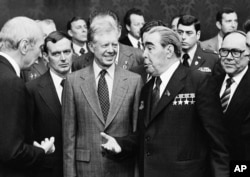The United States and Russia urgently need to restart cooperation to prevent the spread of nuclear weapons, a new report says.
The International Institute for Strategic Studies, or IISS, based in London released the report. It is called “Once and Future Partners: The United States, Russia and Nuclear Non-Proliferation.”
The study uses formerly secret documents to show incidents in which the U.S. and Western countries cooperated with Russia to limit the spread of nuclear weapons in the past.
Cold War competitors worked together to limit nuclear arms
One important example of cooperation during the period known as the Cold War took place in August of 1977.
Soviet spy satellites showed preparations for a nuclear weapons test at a military base in South Africa. At the time, South Africa was ruled by a system of racial separation known as apartheid. The Soviets consulted with the U.S. before publicly announcing their findings.
Nicholas Redman is with the IISS. He spoke about relations between the U.S. and Soviet Union. He said the incident shows that, even during the tense period of the Cold War, the two sides could work together.
Redman said, “The Soviets took the risk of sharing this intelligence with the United States.”
South Africa denied it planned to carry out a nuclear weapons test. However, U.S. intelligence soon confirmed the presence of the test site. It helped pressure South Africa to cancel its plans.
Another example was the cooperation between U.S. President Jimmy Carter and Soviet leader Leonid Brezhnev.
Redman says that personal relationships were important, but other supports needed to be in place to prevent the spread of nuclear weapons.
“The fact that there were arms control specialists and scientific specialists in both governments, the fact that they met regularly…this was actually vital in building the entire regime,” he said.
The development of a plan for limiting the spread of nuclear weapons took about 10 years of talks in Geneva during the 1960s. The result was the 1970 Non-Proliferation Treaty (NPT). It remains important to nuclear arms control. But the NPT is being questioned more than at any time in its past.
Redman noted: “So there’s a need for an investment to rebuild these habits of cooperation because the threats haven’t actually gone away. There are still a lot of nuclear weapons that aren’t as secure as we would like them to be. There are even more nuclear materials…”
A new arms race?
Some experts are concerned that a new nuclear arms race is developing. They point to Russia developing so called tactical atomic weapons and American efforts to modernize nuclear weapons.
The United Nations has tried to support nuclear arms control with the 2017 Treaty on the Prohibition of Nuclear Weapons. However, no nuclear powers have been willing to sign the treaty.
Redman said, “Unless the United States and Russia cooperate, the problem is they could very quickly lose the initiative they have held up ‘till now.”
I’m Mario Ritter.
Henry Ridgewell reported this story for VOA News. Mario Ritter adapted it for VOA Learning English. Hai Do was the editor.
______________________________________________________________
Words in This Story
regime –n. 1. a form of government 2. a system of managing something
vital –adj. very important
initiative –n. the ability to do something before other do
We want to hear from you. Write to us in the Comments section, and visit our Facebook page.






